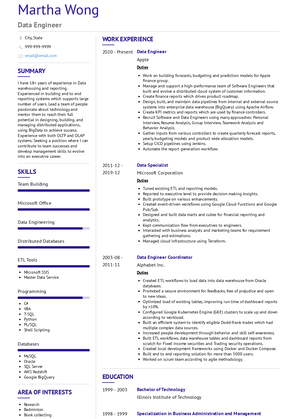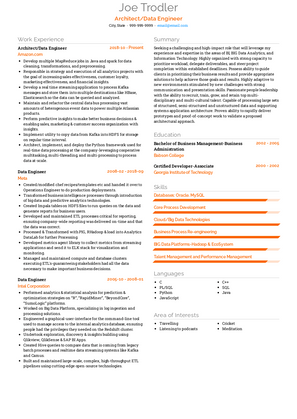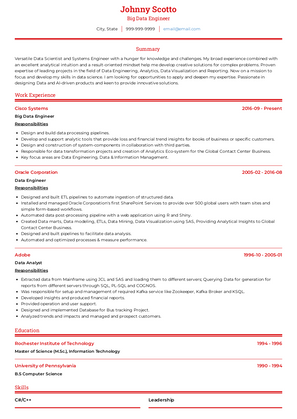3 Data Engineer Resume Examples
This page provides you with Data Engineer resume samples to use to create your own resume with our easy-to-use resume builder. Below you'll find our how-to section that will guide you through each section of a Data Engineer resume.



3 Data Engineer Resume Examples for Senior and Entry Level
Whether you’re looking for your very first data engineer job or you’re an industry vet with decades of experience, you need the best possible data engineer resume to find your next job. Data engineers are needed in just about every industry imaginable, meaning that your skills are in demand and you may be in a position to negotiate for high salaries and other pretty sweet benefits.
What is a Data Engineer?
Data engineers help companies collect, store, and analyze data in large quantities in order to inform decisions about the company’s direction and future. As a data engineer, you’ll design and build these systems. Companies may have the ability to collect extremely large amounts of data from their users and customers. The role of a data engineer is to synthesize this information so that it can be analyzed by data scientists and reported to key decision makers in the company. Data engineers can be confused for data scientists, but, while these two jobs work closely together, they aren’t the same. A data engineer creates infrastructure required for data analysis, while data scientists perform that analysis.
Research suggests that recruiters look at a resume for an average of 6 seconds. To write a resume for a data engineer job, focus on the tangible accomplishments you’ve achieved in your education and previous roles.
In general, your data engineer resume should contain the following:
- A summary
- Your experience
- Your Education
- Your skills, including any professional certifications
Resume Headline for a Data Engineer
A resume headline is a brief phrase that highlights your best attributes in terms of the job for which you’re applying. Resume headlines are an excellent way to customize your resume for each application – choose a few key projects, certifications, or skills that best align with the company’s mission or the job description. Keep your headline brief, and make sure to get specific with what you include – it won’t be useful to anyone to simply list buzzwords.
Data Engineer Resume - A Bad Header Example
Data-driven data engineer with strong analytical and problem solving skills.
Data Engineer Resume - A Good Header Example
Creative data engineer with 10 years of experience finding solutions to problems within large data sets and expert-level proficiency with the Hadoop ecosystem.
Writing the Perfect Data Engineer Resume Work Experience
This is where you can really start bragging. Alison Green, author of Ask a Manager, highlights the single biggest resume mistake she saw in her time as a hiring manager: “Writing a resume that reads like a series of job descriptions.”
“The bullet points they use to describe what they did for each job just list activities and read like a job description for the role might,” she says. “For example, ‘edit documents,’ ‘collect data,’ or ‘manage website.’”
Bad entries focus on responsibilities you had at a previous job, but don't describe what you achieved there. Hiring managers will likely already understand the types of tasks you performed at previous jobs. Your goal is to show them how good you are at performing those tasks! Be specific – it’s great to say you received positive feedback at work, for example, but what was the feedback on, and why did you deserve it? Ultimately, how did your presence at this position improve the overall standing of the company?
Listing Your Data Engineering Skills on a Resume
What skills should you include on a data engineering resume? While you should always try and list the skills that the job posting is asking for, there are some skills that come with the territory of being a data engineer. As a data engineer, hiring managers will want to make sure you bring a specific skill set to the table that will allow you to fit in with the workflow of your potential new company. Looking for more information about adding skills to your resume? Check out our resume skills guide here.
Top 20 Data Engineering Skills for 2022
- Data pipelines
- SQL
- R
- Python
- Java
- Other programming skills
- Hive
- Pig
- Spark
- Hadoop
- MapReduce
- Other big data programs
- Amazon Web Services
- Microsoft Azure
- Other cloud software
- MongoDB
- Oracle
- Machine learning
- Data analysis
- ETL pipelines
Related Resumes
Something about this job catch your eye, but you aren’t quite sure if it’s a match? Check out these related resumes and discover where your next career move could take you.
- Data Analyst Resume Samples
- Developer Resume Samples
- Full Stack Developer Resume Samples
- Programmer Analyst Resume Samples
Data Engineer Salaries
Because data engineers are in high demand, and because their skills are so specialized, you likely already know that data engineers stand to make a lot of money. In fact, according to Glassdoor the average salary for a data engineer in the US is $112,000 per year. Keep in mind, however, that salaries can and will vary depending on the company you work for, your experience, and any additional skills or certifications you have.
Also, depending on the cost of living in your state or region, salaries may fluctuate. If you live in a city with a very high cost of living, for example, your salary may be much higher, but your day-to-day expenses will also be more expensive.
How to Become a Data Engineer
Data engineering exists at the midpoint between being a data scientist and a software engineer. Since this career path is still relatively new (though growing incredibly quickly), there’s no one set, clear-cut way to become a data engineer. However, there are a few steps that data engineers all tend to take.
Becoming a data engineer usually first requires becoming an excellent software developer. Data engineers create programs aimed at the collection and analysis of data. You’ll need to prove to hiring managers that you’re comfortable using programming languages, databases and database management, and data workflows.
What Should You Study to Become a Data Engineer?
Most data engineers have studied computer science at at least an undergraduate level. In general, an undergraduate degree is a requirement for data engineering jobs – some may even require advanced study such as a master’s degree. Keep in mind, however, that you may need to complete further professional training, or gain additional experience, to become a successful data engineer. While the programming aspect of the job is covered by a computer science degree, you may consider becoming further educated about databases and other aspects of data science.
Final Thoughts
Despite being a relatively new career, data engineering jobs are in high demand, and those who work in this career are well-paid and happy to be doing interesting, useful, and unique work. Whether you’re brand new to data engineering or you have years of experience and you’re looking for your next step, your data engineer resume should be ready to showcase your most attractive skills and most impressive achievements.
A professionally designed resume is one way to make your application stand out from the crowd. Whether you choose to use eye-catching color, a unique format, or simply a clean and polished template with your skills and achievements on display, a VisualCV Pro membership could be the thing that takes your career to the next level.
How can I highlight my experience as a Data Engineer on my resume?
Emphasize your expertise in designing and building scalable data pipelines, managing ETL processes, and ensuring data quality. Highlight your role in transforming raw data into usable formats, collaborating with cross-functional teams, and optimizing data workflows.
What are the key skills to feature on a Data Engineer's resume?
Focus on skills such as data architecture, ETL development, and database management. Detail your proficiency with programming languages like Python or SQL, your experience with big data tools like Hadoop or Spark, and your ability to work with cloud platforms like AWS or Azure.
How do I demonstrate my ability to build data pipelines on my resume?
Provide examples of data pipelines you have built or optimized, mentioning specific technologies and tools used. Highlight your role in automating data processing tasks and improving data accessibility for analysts and stakeholders.
Should I include metrics on my Data Engineer resume? If so, what kind?
Yes, include metrics such as reductions in data processing time, increases in data reliability, or improvements in data accessibility. These figures help quantify your contributions to data engineering projects.
How can I showcase my experience with cloud platforms on my resume?
Mention specific cloud services you have used, such as AWS Redshift, Azure Data Lake, or Google BigQuery. Describe how you’ve implemented cloud-based data solutions, ensuring scalability and cost-efficiency.
What kind of achievements should I highlight as a Data Engineer?
Highlight achievements like successfully migrating data warehouses to the cloud, improving ETL efficiency, or being recognized for innovative solutions in data processing. Include any initiatives that led to enhanced data quality or faster data processing times.
How do I address a lack of experience in a specific data engineering area on my resume?
Emphasize your core technical skills and highlight relevant projects, certifications, or coursework that demonstrate your ability to learn and adapt. Focus on skills that are transferable, such as data modeling or software development.
How important is collaboration for a Data Engineer role?
Collaboration is essential, as it involves working closely with data analysts, data scientists, and business stakeholders. Emphasize your experience in understanding business requirements, translating them into technical solutions, and supporting teams with clean and reliable data.
How do I demonstrate my ability to ensure data quality on my resume?
Mention your experience in implementing data validation techniques, setting up automated checks, and maintaining documentation for data processes. Highlight your attention to detail and commitment to delivering accurate and reliable data.
Should I include certifications on my Data Engineer resume?
Yes, certifications such as AWS Certified Data Analytics, Google Professional Data Engineer, or Microsoft Azure Data Engineer can strengthen your resume by showcasing your specialized knowledge and commitment to professional growth.
-
How can I highlight my experience as a Data Engineer on my resume?
-
What are the key skills to feature on a Data Engineer's resume?
-
How do I demonstrate my ability to build data pipelines on my resume?
-
Should I include metrics on my Data Engineer resume? If so, what kind?
-
How can I showcase my experience with cloud platforms on my resume?
-
What kind of achievements should I highlight as a Data Engineer?
-
How do I address a lack of experience in a specific data engineering area on my resume?
-
How do I demonstrate my ability to ensure data quality on my resume?
Copyright ©2024 Workstory Inc.
